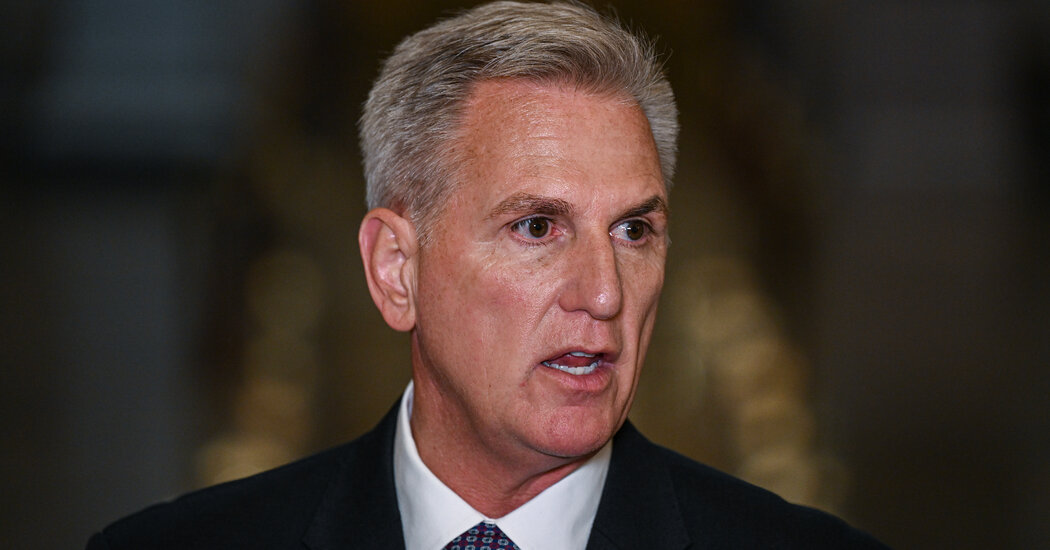A group of hard-line Republicans hijacked the House floor on Tuesday, grinding legislative business to a halt for several hours in a striking display of ire at Speaker Kevin McCarthy for making a deal with President Biden to suspend the debt limit and banding together with Democrats to muscle it to passage.
The mutiny, staged by nearly a dozen members of the ultraconservative House Freedom Caucus as leaders sought to bring up legislation to guard against restrictions on gas stoves and other federal regulations, reflected the bitter acrimony lingering in the Republican ranks after passage of the debt limit measure last week.
It indicated that, even as right-wing lawmakers suggest they are not yet inclined to try to oust Mr. McCarthy from his post over the compromise, they plan to use their clout in the closely divided House to make the speaker’s job impossible unless he bows to their will.
“We’re concerned that the fundamental commitments that allowed Kevin McCarthy to assume the speakership have been violated as a consequence of the debt limit deal, and the answer for us is to reassert House conservatives as the appropriate coalition partner for our leadership, instead of them making common cause with Democrats,” Representative Matt Gaetz of Florida told reporters.
He spoke after he and 10 other Republicans took the extraordinary step of voting against a procedural measure to set ground rules for legislative debate — usually a party-line vote — to register their protest, catching Mr. McCarthy and his leadership team off guard. Their decision to stage the demonstration was all the more remarkable because the members actually supported the underlying bill.
The move led to chaos on the House floor, where, for nearly an hour, Representative Steve Scalise of Louisiana and Representative Tom Emmer of Minnesota, the second- and third-ranking Republican leaders, huddled with the holdouts near the back of the chamber, trying in vain to persuade them to reconsider. Conceding defeat, Mr. Scalise eventually switched his own vote to “no” to allow the measure to be reconsidered. The result was that the rule failed by a vote of 206 to 220, with a dozen Republicans opposing it, the first time in almost 21 years that such a procedural measure had been defeated on the House floor.
It underscored Mr. McCarthy’s lack of control over his fractious conference.
“In a narrow majority, individual members have outsized power,” Representative Patrick T. McHenry of North Carolina told reporters after the vote, as members of the Freedom Caucus huddled with Mr. McCarthy in his Capitol office suite.
Members of the far-right group noted that the speaker had only been able to win their votes in a drawn-out, 15-round election for the post in January because he promised to empower them, and warned that they would continue using guerrilla tactics to disrupt the House unless he did so.
Representative Dan Bishop of North Carolina accused Mr. McCarthy and his team of trying to “pull the pin on the grenade and roll it under the tent of Republican unity” by agreeing to the debt limit deal, which contained spending cuts only a fraction as large as G.O.P. lawmakers had endorsed in a bill they pushed through in April. “What happens depends on how leadership is inclined to reciprocate.”
A continued protest would weaken Mr. McCarthy substantially, undercutting his ability to pass bills in a chamber where they can normally afford to lose no more than a handful of votes.
Until Tuesday, Mr. McCarthy had been able to maneuver his way through that tight margin with last-minute deals and moves to placate holdouts, keeping enough of his party in line to avoid any embarrassing defeats on issues including border security and federal spending cuts.
But Freedom Caucus members took umbrage at the speaker’s efforts to rally Republican votes for the debt limit bill, accusing him of using hardball tactics to try to bully them into backing the deal.
Representative Andrew Clyde of Georgia has claimed that leaders threatened to deny him a vote on his legislation to kill stricter federal regulations on pistols with stabilizing braces if he did not vote to advance the debt ceiling bill to a final vote — a charge that G.O.P. leaders deny.
Late Tuesday afternoon, Mr. Clyde — who did not join his Freedom Caucus colleagues in the protest vote on Tuesday — told reporters that leaders had promised him that his bill would come to the floor next week. But that was unlikely to quell the fury of right-wing Republicans over the debt limit deal.
“Unfortunately, two weeks ago, a deal was reached and it broke away from what had been working,” Representative Chip Roy of Texas told reporters, lamenting Mr. McCarthy’s decision to negotiate with Democrats instead of working with Republicans to find a deal that would preserve party unity. “It’s going to take a lot to restore our faith that we can do that in light of what happened with the debt ceiling.”
In addition to Mr. Roy, Mr. Bishop and Mr. Gaetz, the other Republicans who joined in the protest vote were Representatives Andy Biggs of Arizona, Lauren Boebert of Colorado, Ken Buck of Colorado, Tim Burchett of Tennessee, Eli Crane of Arizona, Bob Good of Virginia, Ralph Norman of South Carolina and Matt Rosendale of Montana.


